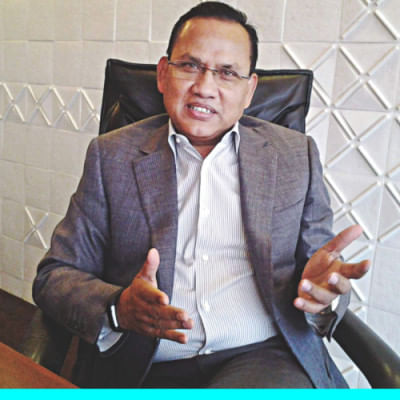DBL Group: Championing green production methods

Investment in energy-efficient production technologies pays off in due course -- be it in terms of lower electricity and water bills or lesser carbon emissions.
Take the case of DBL Group, one of the leading garment exporters in Bangladesh, which embraced green methods in a big way and is now reaping the benefits.
Between 2013 and 2014, the company invested $2.4 million to upgrade its facilities, and got the returns within six months, according to its Managing Director MA Jabbar.
“We took up the investment for two reasons -- out of our concern for the environment and to bring down our costs of production.”
At present, the company saves about $4.67 million from its lower consumption of water, dyes and energy and lower carbon emission, he told The Daily Star in an interview.
For instance, in 2010, the factory used to consume 119 litres of water for washing a kilogram of fabric, but now it uses 55 litres.
The company has also constructed a green building at Nayanpur in Gazipur, which got the LEED certification from the US Green Building Council.
DBL will begin production in the LEED certified building from next month, where more than 7,000 workers will be employed.
The embrace of green methods came thanks to the International Finance Corporation's Partnership for Cleaner Textile (PaCT) programme that started in 2011 on a pilot basis.
Under the PaCT programme, which was launched in 2013 on a full-fledged basis, garment and textile makers are advised to adopt modern technologies in factories to reduce water and energy consumption.
The first phase of the PaCT programme, which ran from 2013 through to 2017, was implemented in 215 factories at a cost of $11 million.
DBL was one of the apparel giants that had adopted the programme. Now, the company is participating in its second phase, which will build on the accomplishments of the first phase.
“We have been trying to save water and energy on all fronts, like harvesting rainwater, using less salt, recycling and reusing water, using rooftop solar panels in the factories,” said Jabbar.
The group also adopted the programme named Sustainable Action and Vision for better Environment in collaboration with the clothing brand PUMA and Germany's DEG to save water and environment.
The company used 1.86 crore litres of rainwater and saved 2.12 lakh of salt for production of 3.10 lakh kgs of fabrics between May 2016 and September 2017, Jabbar said.
The company will use environment-friendly equipment in the upcoming projects.
DBL has already started developing the Shreehatta Economic Zone at Habiganj that was awarded by the Bangladesh Economic Zones Authority recently.
Construction works of the zone spanning 170 acres of land at Habiganj has already started.
“I am hopeful that the production in the factories on the zone will start from the middle of next year. We are heading very aggressively towards the SEZ,” Jabbar said.
DBL will set up four to five big production units of spinning and garment factories on the SEZ.
Currently, DBL has 19 different textile and garment factories in different areas of the country and employs 30,000 workers.
DBL exported garment items worth $400 million in 2016 and is now aiming to hit the $1 billion-mark by 2020, Jabbar said.
In the Habiganj units, DBL will mainly manufacture value-added items like sportswear and lingerie.
DBL supplied fabrics to sportswear giant Adidas as well as to many companies in Sri Lanka.
“I am proud that DBL has supplied its quality fabrics to Adidas for producing sportswear.”
DBL is also going to open a garment factory at Mekele town near Tigray region in Ethiopia mainly to enjoy the zero-duty benefit the country gets upon export to major markets like the US and the EU.
Production in the new unit in Ethiopia is expected to begin from February 2018, Jabbar said.
“It was supposed to start from December this year, but unfortunately there has been a delay in the construction of the factory.”
DBL invested $100 million on the venture, for which it got the permission from the Bangladesh Bank, Jabbar said.
Initially, DBL will employ 1,700 workers mainly to manufacture knitted t-shirts for the US, the EU and the Middle East market.
“The zero-duty benefit to the major markets is the main reason for setting up the garment factory in Ethiopia,” he added.

 For all latest news, follow The Daily Star's Google News channel.
For all latest news, follow The Daily Star's Google News channel. 



Comments